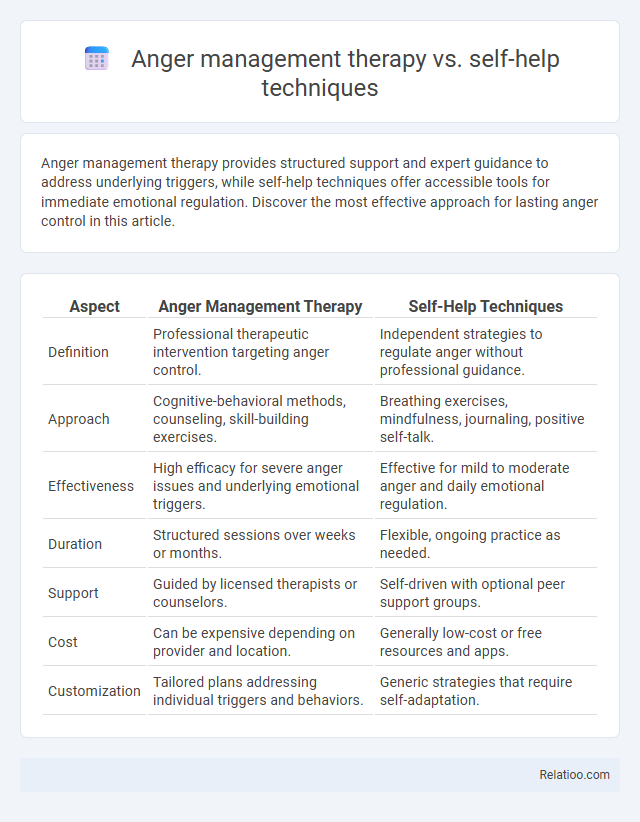Anger management therapy provides structured support and expert guidance to address underlying triggers, while self-help techniques offer accessible tools for immediate emotional regulation. Discover the most effective approach for lasting anger control in this article.
Table of Comparison
| Aspect | Anger Management Therapy | Self-Help Techniques |
|---|---|---|
| Definition | Professional therapeutic intervention targeting anger control. | Independent strategies to regulate anger without professional guidance. |
| Approach | Cognitive-behavioral methods, counseling, skill-building exercises. | Breathing exercises, mindfulness, journaling, positive self-talk. |
| Effectiveness | High efficacy for severe anger issues and underlying emotional triggers. | Effective for mild to moderate anger and daily emotional regulation. |
| Duration | Structured sessions over weeks or months. | Flexible, ongoing practice as needed. |
| Support | Guided by licensed therapists or counselors. | Self-driven with optional peer support groups. |
| Cost | Can be expensive depending on provider and location. | Generally low-cost or free resources and apps. |
| Customization | Tailored plans addressing individual triggers and behaviors. | Generic strategies that require self-adaptation. |
Introduction to Anger Management
Anger management therapy involves structured sessions with trained professionals who guide individuals through identifying triggers and developing coping strategies, enhancing emotional regulation effectively. Self-help techniques rely on personal effort using tools like mindfulness, journaling, and breathing exercises to control anger but may lack personalized feedback and accountability. Anger management introduces crucial skills such as recognizing early signs, practicing relaxation techniques, and applying cognitive restructuring to reduce aggressive responses and improve interpersonal relationships.
Understanding Anger: Causes and Triggers
Understanding the causes and triggers of anger is crucial for effective management, whether through anger management therapy or self-help techniques. Therapy offers personalized strategies to identify deep-rooted emotional patterns and cognitive distortions, while self-help focuses on practical tools like mindfulness and relaxation exercises to control immediate responses. You benefit most from recognizing your specific triggers and implementing consistent techniques tailored to your emotional landscape.
What is Anger Management Therapy?
Anger management therapy involves structured psychological interventions designed to help individuals recognize triggers, control emotional responses, and develop coping strategies to prevent aggressive behavior. Unlike self-help techniques, which rely on individual effort through books or apps, therapy provides personalized guidance with a trained professional to address underlying issues and promote long-term behavioral change. Effective anger management therapy combines cognitive-behavioral methods, relaxation training, and communication skills development for comprehensive support.
Types of Anger Management Therapy
Cognitive-behavioral therapy (CBT) remains the most effective type of anger management therapy, targeting thought patterns to control emotional responses and impulsive behaviors. Other therapeutic approaches include relaxation techniques, which focus on breathing and mindfulness exercises, and group therapy that provides social support and shared experiences to improve anger regulation. Self-help techniques, while accessible, often lack the structured guidance and personalized interventions found in professional anger management therapy programs.
Benefits of Professional Anger Management
Professional anger management therapy offers personalized strategies and evidence-based interventions that effectively address the root causes of anger, ensuring long-term emotional regulation. Unlike self-help techniques that often rely on generic advice, therapy provides tailored support from licensed therapists who guide you through behavioral changes and coping mechanisms. Your progress in professional anger management is typically monitored and adjusted, maximizing benefits such as improved relationships, reduced stress, and enhanced overall mental health.
Exploring Self-Help Techniques for Anger
Exploring self-help techniques for anger involves practical strategies such as deep breathing, mindfulness meditation, and cognitive restructuring to regulate emotional responses effectively. These methods empower you to identify triggers and develop healthier coping mechanisms without the need for formal anger management therapy, making them accessible and flexible. While professional anger management provides structured support and personalized guidance, self-help techniques offer immediate tools for managing anger in daily life and fostering long-term emotional resilience.
Effectiveness of Self-Help Strategies
Self-help techniques for anger management offer accessible and cost-effective tools such as mindfulness, deep breathing, and cognitive restructuring, which can significantly reduce anger when practiced consistently. Research indicates that individuals engaged in self-help strategies often experience moderate improvements in emotional regulation, though these benefits may be limited by lack of personalized guidance compared to professional anger management therapy. Combining self-help methods with structured therapeutic interventions typically enhances overall effectiveness in controlling anger and preventing aggressive behaviors.
Therapy vs Self-Help: Key Differences
Anger management therapy involves structured sessions with licensed professionals who use evidence-based techniques such as cognitive-behavioral therapy (CBT) to identify triggers and develop coping strategies, offering personalized feedback and accountability. Self-help techniques rely on individual efforts through books, apps, or online resources to practice relaxation, mindfulness, and thought reframing, but lack professional guidance and tailored adjustments. Therapy provides a comprehensive approach with professional support, whereas self-help methods serve as accessible, cost-effective tools for managing anger independently.
Choosing the Right Approach for You
Choosing the right approach for anger management depends on individual needs, severity of anger issues, and personal preferences. Anger management therapy offers structured guidance from professionals, ideal for those with intense or persistent anger problems. Self-help techniques provide flexible strategies for mild anger control and can complement therapy but may lack the personalized support required for deeper emotional challenges.
Final Thoughts on Anger Management Solutions
Anger management therapy offers structured support with professional guidance tailored to your specific triggers and emotional responses, while self-help techniques empower you to identify and control anger through personal strategies like mindfulness and cognitive restructuring. Both approaches provide valuable tools, but therapy often results in deeper behavioral change due to accountability and expert feedback. Your optimal anger management solution depends on the severity of your anger issues and commitment level, balancing professional intervention and self-directed methods for effective emotional regulation.

Infographic: Anger management therapy vs Self-help techniques
 relatioo.com
relatioo.com